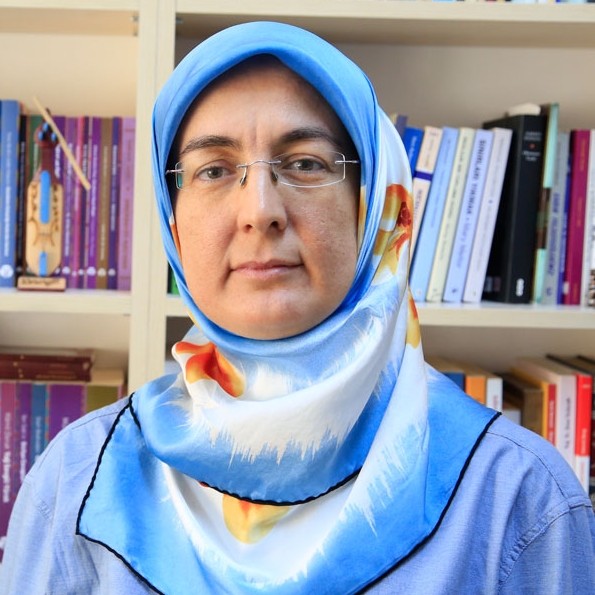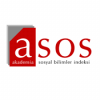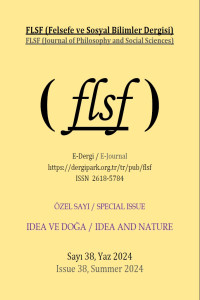Research Article
Issue Editorial Board

Ankara doğumlu. Lisans ve lisansüstü eğitimini Hacettepe Üniversitesi Felsefe Bölümü’nde tamamladı. Lisansüstü eğitimi sırasında Viyana Çevresi’nin bilimsellik ölçütünü incelediği yüksek lisans tezini ve Hegel, Marx ve Fukuyama’nın tarih felsefelerini incelediği doktora tezini yazdı. Hâlen Ankara Üniversitesi Felsefe Bölümü’nde öğretim üyesi olarak görev yapmakta ve çalışmalarını epistemoloji, ontoloji ve dil felsefesi alanlarında sürdürmektedir.
Başlıca eserleri: Tarihin Sonu Fikri ve Küreselleşme: Fukuyama’nın Hegel ve Marx Yorumu’nun Değerlendirilmesi (2015); Modern Mantık (Ed. 2017); Çağdaş Fransız Felsefesi (Ed., 2019); Emek ve Mülkiyet (Ed., 2022); Başkası ve Şiddet (Ed., 2022)


Dr. Erman Kaçar, Ankara Üniversitesi Felsefe Bölümü, Sistematik Felsefe ve Mantık anabilim dalında, Badiou ve Spinoza ontolojilerindeki "Bir" ve "Boşluk" kavramlarını ele alan "Bir Ontoloji Sorunu: Badiou ve Spinoza" başlıklı tezi (2016) ile yüksek lisans derecesi kazanmış, “Nietzsche’de Ahlakın Olanağı Sorununa Alternatif Yaklaşımlar: Arzu Etiğine Doğru” başlıklı tezi (2022) ile doktor olmuştur.
Modern felsefe sonrası dönemde etik ve çağdaş Fransız felsefesi temel çalışma alanlarını oluştururken özellikle uzmanlaştığı isimler Friedrich Nietzsche ve Jacques Lacan'dır. Kaçar, Badiou ve Lacan ontolojileri üzerine çalışmış, Lacan ontolojisi ve topolojisi üzerine seminerler vermiştir. "Lacan ve Topoloji", "Aynanın Ötesine Geçmek: Öznenin Trajedisi", "Adlandırılamayanın Sınırında Etik Eylemin Olanağı: Lacan ve Kierkegaard’da Kaygı", "Nesne a ve Eksiğin Eksikliği Ekseninde Kaygı: Kafka'nın Dönüşüm'ünde Kapsayıcı Metafor olarak Metamorfoz", "Dikişler ve İğneler: Alain Badiou ve Siyaset Ontolojisi", "Bending the Structure: Jacques Lacan Along the Axis of Structuralism and Poststructuralism" gibi Lacanyen makaleler başta olmak üzere önemli akademik dergilerde yayımlanmış birçok araştırma makalesinin yazarıdır.


Çalışmaları için bkz.:
https://dergipark.org.tr/tr/pub/@eren1984
https://www.kitapyurdu.com/yazar/mehmet-eren-gedikli/248948.html

Aim & Scope
* FLSF aims to be one of the prestigious academic journals, to bring light into variety of issues and topics in philosophy and social sciences, to indicate relevances, relationships, transition and continuity that are not yet enlightened in the history of philosophy and social sciences, to correct misunderstandings and misconceptions within problem-based academic writings rather than publishing ideological or popular articles that cannot go beyond being a summary or introduction. Besides, while facing contemporary problems in economics, politics, art and science, FLSF aims to encourage publishing articles that can provide permanent solutions or reintroduce already expressed ideas or original approaches in historical thinking in a way that they can contribute to social, scientific, and political development of the society. For this reason, it is also open to the polemical writings that could enliven the intellectual environment of the society.
Philosophical articles
Author Guidelines
1) FLSF (Journal of Philosophy and Social Sciences) is a journal of philosophy. Provided that being theoretical and philosophical, also open to evaluate papers on the other fields of social sciences.
2) FLSF is a biannual (Spring/Fall) peer-reviewed journal.
3) FLSF is an "e" electronic journal. Printed version of the journal is not provided to any author or individual.
4) Content: Only research papers are accepted for the review process. The articles should not be published anywhere else before. The responsibility of the articles belongs to the author.
5) Language: Articles can be either in Turkish or English.
6) Title: The title of the article should be in Cambria, 16-point bold font. Title should be concise and informative regarding the subject. Try to avoid abbreviations where possible.
7) Author’s Information: Author’s name must be written in Cambria and 11-point font, just under the headline, leaning to the right; all letters of the surname must be written in uppercase.
The university or the institution where author(s) currently works should be stated by a footnote attached to the surname and no title should be used.
8) Abstract: It should be in English and between 100-200 words just below the author's name and with 10 fonts, Cambria and italic.
The abstract should state briefly the purpose of the study, methods, the principal results and major conclusions.
9) Keywords should be added to abstract and should not be less than four and more than eight.
10) Papers should not exceed 5500 words.
11) The margins of paper should be set up as 4,5 cm on the left and the right, 5 cm on the top and 4 cm on the bottom.
12) The subtitles should be written in bold and 10 font size on the left margin.
13) Accepted texts should be written in Cambria, 10 font size in the Word Program and sent to flsfdergisi@hotmail.com.
14) Paper Review Process: The articles submitted to the journal are primarily looked over by the editors in terms of its content and editorial principals and anonymously sent to two reviewers. Every evaluated paper should get the approval of two referees. If one of the referees has rejected and the other one has approved, the editor sends the paper to the third referee. In line with the opinions and suggestions of the third referee, editor acts in accordance with her/his own authority. Chief Editor of the journal unilaterally reserves the right to REJECT even if the paper has been approved by referees. In this case, none of the author(s) can claim a right or demand. All kinds of management, practice and procedure belong to the chief editor of the journal.
The papers revised according to Paper Review Forms should not be sent to the editorial board later than two weeks.
15) Unpublished articles will not be returned and the authors will only be informed about the rejection.
16) Footnote Writing Principles:
Articles submitted for publication to FLSF (Journal of Philosophy and Social Sciences) must comply with Chicago style (Notes and Bibliography).
17) Prepare a bibliography at the end of the text taking into account the alphabetical order of the surnames of the authors. Bibliography must be based on the sources that have collected in the notes and which were benefited from.
18) The internet resources should be indicated in the references part under the title of “INTERNET RESOURCES”. The link should be included in the resources and the Access date should be after the link.
19) Papers for the volume of Spring should be sent at the latest for February and papers for the volume of Fall should be sent at the latest of September.
Articles are sent to the reviewers from the first day of March on the Spring volume, and from the first day of October on the Fall volumes. Two or three weeks are granted to the referees (depending on the length and shortness of the article, whether the time of the jury is appropriate). Reports are forwarded to the authors as they arrive.
Spring volumes are published between May 15-31, Fall volumes are published between December 15-31.
Ethical Principles and Publication Policy
PUBLICATION POLICY
i) FLSF (Journal of Philosophy and Social Sciences) is a philosophy journal. Only research articles in the field of philosophy are published (philosophy articles by researchers working in other fields of social sciences are also included).
ii) This peer-reviewed journal is published twice a year (Spring/Autumn semesters).
Articles for the Spring issue must be submitted by the end of February at the latest; for the Fall issue, it must be submitted by the end of September at the latest. (If the number of articles exceeds the anticipated amount, article acceptance may be stopped before these dates to prevent accumulation.)
Articles begin to be sent to referees on the first day of March for Spring issues, and on the first day of October for Fall issues. Even if the article has been sent by the author in advance, the evaluation process does not start before these dates.
Referees are given 2 or 3 weeks (depending on the length and shortness of the article and whether the referee's time is available). After the evaluation process is completed, whether positive or negative, the evaluation result is communicated to the authors.
iii) FLSF is an electronic journal. There is no printed version of the journal.
iv) Content: Only philosophical research articles are evaluated. (Philosophical articles by researchers working in other fields of social sciences are also included). Articles must not have been published elsewhere. The responsibility of the articles belongs to the author(s).
v) Language: Articles can be published in Turkish or English.
vi) Article Evaluation Process: Articles submitted through ULAKBİM Dergipark are primarily evaluated for content, spelling rules, etc. It is examined by the editors from all aspects and sent anonymously to two referees on the subject for evaluation. Each article entering the evaluation process must receive positive opinions from two referees. In cases where one of the referees gives a negative opinion and the other gives a positive opinion, the article is either sent to a third referee or (if the subject of the article is within the scope of areas of interest and expertise) it is evaluated by the journal editors.
In special circumstances, editors reserve the right to reject the article, even in cases where the referees express a positive opinion. In such cases, authors agree not to claim rights and submit their work to the evaluation process.
After the articles requiring corrections have been revised, they must be sent back to the editorial board via Dergipark within two weeks at the latest.
vii) In our journal, the articles of the owner, editor-in-chief and editor are not evaluated and published. On the other hand, the articles of the assistant editors are carried out according to the evaluation criteria and processes valid for all authors, based on the blind referee system, and the evaluation process is carried out by the editors themselves or by an assistant editor other than themselves, and are published if they receive two positive reports.
viii) Unpublished manuscripts will not be returned. The author(s) are informed.
ix) Spring issues are published between 15-31 May, Fall issues are published between 15-31 December.
ETHICAL PRINCIPLES
It is aimed that all stakeholders (authors, referees, editorial board and editorial board) who have a role and contribution to the publication of articles in FLSF (Journal of Philosophy and Social Sciences) contribute to the correct progress of scientific and philosophical research. For this reason, it is essential that the parties do things that will improve each other and make suggestions. Compliance with scientific ethical principles is important in scientific studies prepared in accordance with this goal.
These ethical principles are based on the guidelines and policies published by the Committee on Publication Ethics (COPE). FLSF Magazine expects all parties to adopt and fulfill the following ethical responsibilities at every stage of the publication process, and undertakes this on its own behalf.
Duties of Editor-in-Chief & Assistant Editors
Objectivity
Editor-in-chief & assistant editors of the journal are account for deciding which of the manuscripts submitted to the journal ought to be published. In this process, the authors of the manuscript are not distinguished based on his/her race, ethnicity, gender, religion and citizenship by the editors. Editors´ decision to accept, revise or reject a manuscript for publication should be based merely on the importance, originality and clarity of the manuscript, and also convenience of the study performed in manuscript to the coverage of the journal.
Confidentiality
Editor-in-chief and assistant editors staff must not reveal any information about a submitted manuscript to anyone but the corresponding author, reviewers/potential reviewers and the publishing personnel. Editors will assure that all material submitted by authors remains confidential during the review process.
Conflicts of interest & Disclosure
Unpublished materials disclosed in a submitted manuscript must not be utilized in any reviewers’ own studies without expressing written permission of the author. Exclusive information or opinions attained from peer review process must be maintained confidential and not used for personal benefit. Reviewers ought not to take into account manuscripts in which they have conflicts of interest deriving from competitive, collaborative or other relationships/connections with any of the authors, companies or institutions linked to the articles.
Peer review process
The editor-in-chief/assistant editors must assure that a double-blind peer review process is effectively performed for each manuscript submitted to journal system.
Management of unethical behaviour(s)
The editors, together with the publisher(s), should take rationally responsive measures when ethical complaints have been presented regarding a submitted manuscript or published article.
Duties of Author(s)
Authorship of the paper
Authorship should be narrowed to those who have made a vital contribution to the reported study including conception, execution, design and interpretation. All authors made significant contributions to the submitted manuscript should be listed as co-authors.
Originality and plagiarism
The authors are responsible for the content, language and originality of the manuscript they submitted. The authors should assure that they have composed their original works entirely, and if the authors have used the study and/or words of other authors, that this has been conveniently cited or quoted. Plagiarism takes many forms varying from “passing off” someone´s paper as the authors’ own paper to copying or paraphrasing important parts of someone´s paper (without attribution), to claiming results from research performed by others. Plagiarism in all its forms comprises unethical publishing behaviour and is inadmissible. Before being sent a manuscript to reviewers, it is checked in terms of similarity by iThenticate to explore the plagiarism.
Acknowledgement of funding sources
All funding sources for the research reported in the manuscript should be acknowledged thoroughly at the end of the manuscript before references.
Disclosure and conflicts of interest
All authors should reveal in their manuscript any financial or other substantive conflict of interest which may be construed to affect the findings or interpretation of their manuscript. All financial support sources for the project should be disclosed as well. Disclosed examples of potential conflicts of interest include employment, consultancies, stock ownership, honoraria, paid expert testimony, patent applications/registrations, and grants or other funding. Potential conflicts of interest should be declared at the earliest stage possible.
Reporting standards
Authors of manuscript should present an accurate explanation of the study conducted and an objective discussion of its importance. Underlying data should be accurately given in the manuscript. A paper should include sufficient detail and references to allow other researchers to repeat the study. Tricky or knowingly imprecise statements form unethical behaviour and are unacceptable. Review and professional publication articles should also be precise, original and objective, and editorial opinion works should be described overtly as such.
Data access & retention
Authors might be asked to ensure the raw data in connection with a paper for editorial review process, and should in any event be prepared to keep in such data for a moderate time after publication.
Multiple, redundant or concurrent publication
Submitted manuscripts must not be under consideration of any other journal. Submitting the same manuscript to more than one journal concurrently comprises unethical publishing behaviour. The authors must also assure that the article has not been published elsewhere before.
Principal errors in published studies
When an author corresponds to a significant error or inaccuracy in his/her own published work, it is the author´s obligation to notify swiftly the journal editor or publisher and cooperate with the editor to withdraw or correct the paper.
Duties of Reviewers
Reviewers should review and send the review comments in due time period. If the manuscript is not in the reviewer’s field of interest, then the manuscript must be sent back to editor so that the other reviewers can be assigned without losing time.
Contribution
Reviewers are the main members contributing to the quality of the journal being a peer reviewed one. The reviewers who feel unqualified to review the received manuscript must swiftly notify the editor and reject to review that manuscript.
Confidentiality
Any manuscripts received for review must be treated as confidential documents. They must not be shown to or discussed with others except as authorized by the editor.
Objectivity standards
Reviews should be objectively performed. Personal criticism of the author is unsuitable. Referees should frankly express their aspects with supporting arguments.
Acknowledgement of sources
Reviewers should describe relating published study which has not been cited by the authors. Any statement that an observation, derivation, or argument had been previously reported should be accompanied by the relevant citation. A reviewer should also point out to the editor’s attention any vital resemblance or coincide between the manuscript under consideration and any other published paper of which they have personal information.
Disclosure & conflict of interest
Reviewers should not take into account the manuscripts in which they have conflicts of interest derived from competitive, collaborative, or other relationships/connections with any of the authors, companies or institutions linked to the manuscripts.
Price Policy
Our journal does not charge a fee for evaluation or publication processes.
Indexes
Journal Boards
Editorial Board

Ankara doğumlu. Lisans ve lisansüstü eğitimini Hacettepe Üniversitesi Felsefe Bölümü’nde tamamladı. Lisansüstü eğitimi sırasında Viyana Çevresi’nin bilimsellik ölçütünü incelediği yüksek lisans tezini ve Hegel, Marx ve Fukuyama’nın tarih felsefelerini incelediği doktora tezini yazdı. Hâlen Ankara Üniversitesi Felsefe Bölümü’nde öğretim üyesi olarak görev yapmakta ve çalışmalarını epistemoloji, ontoloji ve dil felsefesi alanlarında sürdürmektedir.
Başlıca eserleri: Tarihin Sonu Fikri ve Küreselleşme: Fukuyama’nın Hegel ve Marx Yorumu’nun Değerlendirilmesi (2015); Modern Mantık (Ed. 2017); Çağdaş Fransız Felsefesi (Ed., 2019); Emek ve Mülkiyet (Ed., 2022); Başkası ve Şiddet (Ed., 2022)


Dr. Erman Kaçar, Ankara Üniversitesi Felsefe Bölümü, Sistematik Felsefe ve Mantık anabilim dalında, Badiou ve Spinoza ontolojilerindeki "Bir" ve "Boşluk" kavramlarını ele alan "Bir Ontoloji Sorunu: Badiou ve Spinoza" başlıklı tezi (2016) ile yüksek lisans derecesi kazanmış, “Nietzsche’de Ahlakın Olanağı Sorununa Alternatif Yaklaşımlar: Arzu Etiğine Doğru” başlıklı tezi (2022) ile doktor olmuştur.
Modern felsefe sonrası dönemde etik ve çağdaş Fransız felsefesi temel çalışma alanlarını oluştururken özellikle uzmanlaştığı isimler Friedrich Nietzsche ve Jacques Lacan'dır. Kaçar, Badiou ve Lacan ontolojileri üzerine çalışmış, Lacan ontolojisi ve topolojisi üzerine seminerler vermiştir. "Lacan ve Topoloji", "Aynanın Ötesine Geçmek: Öznenin Trajedisi", "Adlandırılamayanın Sınırında Etik Eylemin Olanağı: Lacan ve Kierkegaard’da Kaygı", "Nesne a ve Eksiğin Eksikliği Ekseninde Kaygı: Kafka'nın Dönüşüm'ünde Kapsayıcı Metafor olarak Metamorfoz", "Dikişler ve İğneler: Alain Badiou ve Siyaset Ontolojisi", "Bending the Structure: Jacques Lacan Along the Axis of Structuralism and Poststructuralism" gibi Lacanyen makaleler başta olmak üzere önemli akademik dergilerde yayımlanmış birçok araştırma makalesinin yazarıdır.

Çalışmaları için bkz.:
https://dergipark.org.tr/tr/pub/@eren1984
https://www.kitapyurdu.com/yazar/mehmet-eren-gedikli/248948.html

2003 yılında Ankara Üniversitesi Devlet Konservatuvarı Opera-Koro Bölümü’nü bitirerek lisans eğitimini tamamlamıştır. 2009 yılında Ankara Üniversitesi Eğitim Bilimleri Fakültesi, Güzel Sanatlar Anabilim Dalı’nda sürdürdüğü Yüksek Lisans eğitimini tamamlamıştır. 2017 yılında Gazi Üniversitesi, Eğitim Bilimleri Enstitüsü, Güzel Sanatlar Anabilim Dalı, Müzik Öğretmenliği Bilim Dalı’nda sürdürdüğü doktora eğitimini “Sistematik Düşüncenin ve Felsefi Yaklaşımların Müzik Anabilim Dalındaki Öğrenciler Düzeyinde İncelenmesi – Gazi Üniversitesi Örneği” isimli tezini yazarak tamamlamıştır. 2019 yılında Ankara Üniversitesi, Dil, Tarih ve Coğrafya Fakültesi, Felsefe Bölümü, Sistematik Felsefe ve Mantık Anabilim Dalı’nda sürdürdüğü ikinci Yüksek Lisans eğitimini “Theodor Adorno ve Walter Benjamin’de Sanat Eserinin Doğası” isimli tezini yazarak tamamlamıştır. 2006’dan 2019’a kadar Ankara Devlet Opera ve Balesi’nde koro sanatçısı olarak çalışmıştır. Kurumda çalıştığı yıllar içinde, başta La Boheme, Nabucco, Don Pasquale, Cosi Fan Tutte, La Traviata, Il Travatore, Aşk-ı Memnu, La Boheme, IV. Murat, Manon Lescaut, Venedikte Bir Gece, Macbeth, Aida, I Puritani, Don Giovanni, Saraydan Kız Kaçırma, Ali Baba ve Kırk Haramiler, Carmen operaları olmak üzere 140’dan fazla farklı eserde yer almış ve 500’e yakın temsil gerçekleştirmiştir. Yine bu süreçte başta Ankara Devlet Opera ve Balesi olmak üzere, TRT Çoksesli Korosu ve Kültür Bakanlığı Çoksesli Korosu’yla gerçekleştirilen birçok konserde tenor grubunda görev almış, solo roller söylemiştir. Çalışmalarını bir süredir müzik ve sanat felsefesi alanlarında sürdürmektedir. Bununla birlikte opera repertuvarı ve literatürü üzerine de çalışmalar yapmaktadır. Özellikle 20. yy. operaları, Wagner ve sonrasındaki opera anlayışı, modern ve avant-garde opera düşüncesi temel çalışma alanlarını ifade etmektedir. Bu bağlamda Phonix yayınevi tarafından yayınlanmış “20. Yüzyılda, 20 Opera” isimli bir kitap yazmıştır. Halen Ses Eğitimi (Şan), Koro, Müzikli Sahne, Felsefeye Giriş, Sanat Felsefesi, Estetik, Müzik Felsefesi, Sanat Tarihi, 20. yy. Sanat Akımları ve Kuramları, Karşılaştırmalı Sanat Akımları ve Kuramları, Müzik Tarihi, Opera Tarihi gibi ders içeriklerinin yürütücüsü olarak çalışmaktadır. 2021 yılından bu yana Ankara Müzik ve Güzel Sanatlar Üniversitesi, Müzik ve Sahne Sanatları Fakültesi, Ses Eğitimi Bölümü’nde Doçent Doktor olarak görev yapmaktadır.


Dil Editörleri


Ankara doğumlu. Lisans ve lisansüstü eğitimini Hacettepe Üniversitesi Felsefe Bölümü’nde tamamladı. Lisansüstü eğitimi sırasında Viyana Çevresi’nin bilimsellik ölçütünü incelediği yüksek lisans tezini ve Hegel, Marx ve Fukuyama’nın tarih felsefelerini incelediği doktora tezini yazdı. Hâlen Ankara Üniversitesi Felsefe Bölümü’nde öğretim üyesi olarak görev yapmakta ve çalışmalarını epistemoloji, ontoloji ve dil felsefesi alanlarında sürdürmektedir.
Başlıca eserleri: Tarihin Sonu Fikri ve Küreselleşme: Fukuyama’nın Hegel ve Marx Yorumu’nun Değerlendirilmesi (2015); Modern Mantık (Ed. 2017); Çağdaş Fransız Felsefesi (Ed., 2019); Emek ve Mülkiyet (Ed., 2022); Başkası ve Şiddet (Ed., 2022)
Danışma Kurulu


Ankara doğumlu. Lisans ve lisansüstü eğitimini Hacettepe Üniversitesi Felsefe Bölümü’nde tamamladı. Lisansüstü eğitimi sırasında Viyana Çevresi’nin bilimsellik ölçütünü incelediği yüksek lisans tezini ve Hegel, Marx ve Fukuyama’nın tarih felsefelerini incelediği doktora tezini yazdı. Hâlen Ankara Üniversitesi Felsefe Bölümü’nde öğretim üyesi olarak görev yapmakta ve çalışmalarını epistemoloji, ontoloji ve dil felsefesi alanlarında sürdürmektedir.
Başlıca eserleri: Tarihin Sonu Fikri ve Küreselleşme: Fukuyama’nın Hegel ve Marx Yorumu’nun Değerlendirilmesi (2015); Modern Mantık (Ed. 2017); Çağdaş Fransız Felsefesi (Ed., 2019); Emek ve Mülkiyet (Ed., 2022); Başkası ve Şiddet (Ed., 2022)




Durmuş Günay, 1953 yılında Isparta'nın Sütçüler ilçesinde doğmuştur. Akademik kariyerine İstanbul Teknik Üniversitesi'nde Makina Mühendisi olarak başlayan Günay, daha sonra Ege Üniversitesi'nde yüksek lisans, Dokuz Eylül Üniversitesi'nde ise doktora yapmıştır. Akademik hayatı boyunca çeşitli üniversitelerde öğretim üyeliği ve idari görevlerde bulunmuş, 1999'da profesör olmuştur.
Günay, mühendislik alanındaki çalışmalarının yanı sıra, bilim ve teknoloji felsefesi, yükseköğretim ve kültürel konular üzerine de çalışmalar yapmış, bu konularda makale ve kitaplar yayımlamıştır. 2000-2008 yılları arasında Zonguldak Karaelmas Üniversitesi'nde bölüm başkanı olarak görev yapmış, 2004-2007 yıllarında ise Tarım ve Ulaştırma Bakanlıklarında danışmanlık yapmıştır.
2008 yılında Yükseköğretim Kurulu (YÖK) Yürütme Kurulu Üyesi olarak atanmış ve bu görevini 2016 yılına kadar sürdürmüştür. 2016'dan itibaren Maltepe Üniversitesi'nde öğretim üyesi olarak çalışmaya devam etmiştir. Durmuş Günay, akademik ve idari kariyeri boyunca Türkiye'nin eğitim ve yükseköğretim sistemine katkı sunmayı gaye edinmiş biridir.

İstanbul Medeniyet Üniversitesi Felsefe Bölümünde öğretim üyesidir. Lisans derecesini (1999) İstanbul Üniversitesi Felsefe Bölümünden, yüksek lisans derecesini aynı okulun Felsefe Tarihi programından, ikinci yüksek lisans derecesini (2010) Boston Üniversitesi Urban Policy programından, doktora derecesini (2010) ise Marmara Üniversitesi Felsefe ve Din Bilimleri programından almıştır. Posthüman: Şehir ve Beden (2021) ve Küreselleşen Karanlık (2023) iki kitabının yanı sıra kötülük, insan, toplumsal cinsiyet, felsefi antropoloji, şehir ve felsefe tartışmaları merkezinde akademik makaleleri ve denemeleri ile Türk düşüncesi, felsefi antropoloji ve toplumsal cinsiyet konularını içeren kitap bölümleri yayımlanmıştır. Siyasal Kitabevinden yayımlanmakta olan posthümanizm serisinin kitap editörlüğünü yapmaktadır. Çalışmalarına felsefî antropoloji, şehir, insan, posthümanizm, çağdaş beden tartışmaları, kötülük felsefeleri ve cinsiyet felsefeleri soru ve sorunları çerçevesinde devam etmektedir.



Lisans eğitimini Süleyman Demirel Üniversitesi ilahiyat fakültesinde tamamlamıştır. "Farabi'de Dil Felsefesi" başlıklı yüksek lisansını SDÜ Sosyal Bilimler Enstitüsü'nde ve "Kadı Abdülcebbar'da Söz-Anlam İlişkisi -Kasdu'l-Mütekellim Problemi Bağlamında- başlıklı doktora tezini SDÜ İlahiyat Fakültesi'nde tamamladı. Doçentlik ve Profesörlük çalışmalarını mantık biliminde hazırlamıştır. Mantık alanında çalışmalarını sürdürmektedir.
Starting from 2024, our journal will be published in 3 issues as two regular and one special issues. These issues will be published In May (regular issue), September (special issue) and December (regular issue).
Only articles within the scope of the file will be included in our special issue.
Thank you for your attention.















